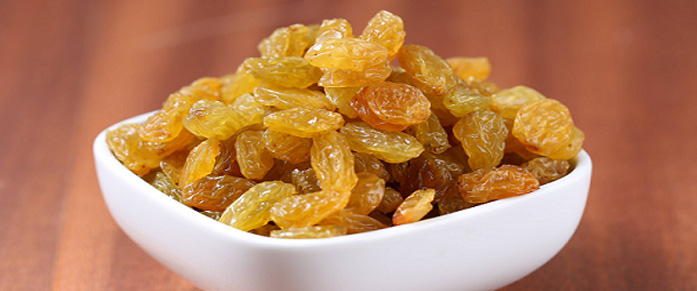What Are Raisins? Nutrition Facts and Health Benefits of Raisins
Today, most raisins are produced from Thompson seedless grapes, which were introduced to California in 1862 by William Thompson. To produce raisins, grapes are laid on brown craft paper trays between the vineyard rows and allowed to dry in the sun when harvested. This is the natural sun-drying process that turns grapes into raisins. The oxidation and caramelization of the sugars during this process result in raisins’ natural dark brown to black exterior. Here we'll discuss Raisins and nutrition facts & health benefits of raisins soaked in water.
Raisins are traditionally sun-dried, but they may also be water-dipped and artificially dehydrated. Raisins are a good source of essential nutrients, minerals, and energy in the form of calories and sugars.
Raisins are commonly used:
- as a salad topping
- mixed into oatmeal
- in yogurt
- in granola or cereal
Raisins Nutrition Facts:
When it comes to raisins nutrition, they have a considerable concentration of phenolic compounds, which play a role in cancer prevention and treatment.
Read Also: Star Fruit- How To Eat It, Health Benefits Of Star Fruit
Sugar and calories
Raisins aren’t exactly a low-calorie, or low-sugar treat. It’s no wonder they are sometimes referred to as “nature’s candy.
High amounts of sugar & calories, which is why keeping an eye on how many raisins you are eating in one sitting is key.
Raisins were just as effective as a sports jelly beans beneficial for athletes engaging in moderate- to high-intensity endurance exercise.
For athletes, raisins are a great alternative for expensive sports chews and gels. They offer a quick source of much-needed carbohydrates and can help improve your performance.
Iron
Raisins nutrition facts iron, along with most dehydrated fruits, are high in iron. One little box (about 1/3 cup) has almost 1 mg of iron — not bad for a mid-afternoon snack. Raisins are also high in potassium and an excellent source of B vitamins.
Iron is important for making red blood cells and helping them carry oxygen to the cells of your body. You need to eat enough iron in order to prevent iron-deficiency anemia.
Fiber
One-half cup of raisins will give you 3.3 grams of fiber-trusted Source, or roughly 10 to 24 percent of your daily needs, depending on your age and gender.
Fiber helps aid your digestion by softening and increasing the weight and size of your stool. Bulkier stools are easier to pass and can help prevent constipation.
Fiber also helps keep you full for longer because it slows down the emptying of your stomach. If you’re trying to lose weight, eating fibrous foods may help.
Read Also: Star Fruit- How To Eat It, Health Benefits And Side Effect
Antioxidants
Raisins are an exceptional source of naturally occurring chemicals called phytonutrients, such as phenols and polyphenols. These types of nutrients are considered antioxidants.
Antioxidants help remove free radicals from your blood and may prevent damage to your cells and DNA. This can lead to diseases like cancer, heart disease, and stroke.
Read Also:Best Source Of Calcium Rich Foods



 Contact Us
Contact Us






 Hospitals
Hospitals
 Doctors
Doctors
 Diagnostic
Diagnostic
 Pharmacy
Pharmacy
 Health Tips
Health Tips
 Blog
Blog

















Comments